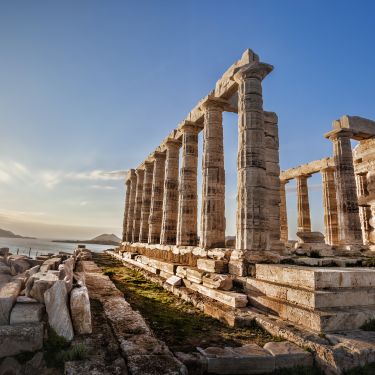Experience Athens Tours with us
- Instant confirmation E-VoucherCity Sightseeing Athens: Hop-On, Hop-Off Bus TourEarn 184 Maharaja PointsfromRs 2353.07 per personRoutes
- Instant confirmation Skip the lineAcropolis Afternoon Tour with Archaeologist GuideEarn 272 Maharaja PointsfromRs 3422.64 per person
- Instant confirmation E-VoucherAcropolis Morning Tour with GuideEarn 296 Maharaja PointsfromRs 3743.52 per person
- Instant confirmation E-VoucherAncient Athens Tour: Acropolis, Parthenon & Acropolis MuseumEarn 848 Maharaja PointsfromRs 10695.76 per person
- Instant confirmation Saver CombosSight of Athens Hop-on, Hop-off Bus + Cape Sounion Sunset TourEarn 384 Maharaja PointsfromRs 4813.09 per person
- Instant confirmation E-VoucherBig Bus Athens Hop-on, Hop-off Sightseeing TourEarn 192 Maharaja PointsfromRs 2460.03 per person
- Instant confirmation E-VoucherDelphi Day Trip from AthensEarn 800 Maharaja PointsfromRs 10054.02 per person
- Instant confirmation E-VoucherGreek Cooking Class with Rooftop Dinner and Acropolis ViewsEarn 784 Maharaja PointsfromRs 9840.10 per person
- Instant confirmation E-VoucherGreek Islands Cruise from Athens: Agistri, Moni and AeginaEarn 1144 Maharaja PointsfromRs 14343.02 per person
- Instant confirmation E-VoucherMuseum of Ancient Greek Technology, AthensEarn 56 Maharaja PointsfromRs 748.70 per person
- Instant confirmation E-VoucherPrivate Transfers between Athens Airport and your HotelEarn 496 Maharaja PointsfromRs 6203.54 per person
- Instant confirmation E-VoucherSights of Athens: Hop-on, Hop-Off Bus (4 lines)Earn 128 Maharaja PointsfromRs 1604.36 per person
- Instant confirmation E-VoucherBig Bus Athens Panoramic Night TourEarn 176 Maharaja PointsfromRs 2246.11 per person
- Instant confirmation E-VoucherAll Day Cruise to Agistri, Moni & Aegina Island: Lunch and Drinks IncludedEarn 1144 Maharaja PointsfromRs 14343.02 per person
- Instant confirmation E-VoucherSunset Dinner Cruise: Swim Stops and Drinks IncludedEarn 840 Maharaja PointsfromRs 10588.80 per person

Our tips for Athens
- Plan your itinerary. Given Athens' abundance of history and culture, it is beneficial to meticulously plan your itinerary. Determine the attractions you most want to see and allocate time accordingly to ensure a well-organized and fulfilling experience.
- See the Acropolis for free. If you don’t want to pay money to explore the Acropolis, there are many places from where you can enjoy stunning views of the attraction. A great way to see the Acropolis is from the Aeropagus. You can go there for free and it's located next to the Acropolis.
- Arrive early. It's important to note that popular attractions such as the Acropolis can experience significant crowds, particularly during peak hours. To optimize your visit and avoid large crowds, it is advisable to arrive early in the morning, allowing you to make the most of your experience.
- Learn some Greek phrases. Although many locals in Athens speak English, demonstrating respect and establishing a connection with the locals can be greatly enhanced by learning a few fundamental Greek phrases such as "hello" (yassou) and "thank you" (efharisto).
Good to know
Athens has a remarkable historical timeline, being one of the world's oldest continuously inhabited cities with a recorded history of over 3,400 years. Athens holds the distinction of being widely recognized as the birthplace of democracy, where the concept was first introduced and practiced during the 5th century BC. The Acropolis, an iconic symbol of Athens, houses the magnificent Parthenon—a temple dedicated to the goddess Athena. Renowned for its architectural and historical significance, it ranks among the world's most important sites. Athens boasts multiple UNESCO World Heritage Sites, including the Acropolis, the Historic Centre of Athens, and the Temple of Hephaestus in the Ancient Agora, showcasing the city's rich cultural heritage. Playing a significant role in Greece's olive oil industry, Athens contributes to the country's reputation for olive oil production. Olive trees and olive oil have held a central place in Mediterranean culture and cuisine for centuries.
Frequently Asked Questions
-
Q: What is the best time to visit Athens?
A:For an optimal experience, consider visiting Athens during the pleasant weather and lesser tourist crowds of spring (April to June) and autumn (September to October). Summers tend to be hot and busy, while winters are generally mild but can be rainy.
-
Q: How do I get around?
A:The Athens Metro provides efficient and convenient travel within the city, with an extensive network that connects major attractions and neighborhoods. Athens has a comprehensive bus system that covers the entire city, including both central areas and suburbs. Well-established bus routes and schedules can be found at bus stops and online. Along the coastal areas, Athens has a tram network that operates, providing scenic views and access to popular destinations such as the beach and the city center. Taxis are easily available in Athens. You can either hail one on the street or locate them at designated taxi stands. It is recommended to ensure that the taxi meter is running throughout your journey.
-
Q: What is the official language spoken in Athens?
A:Greek is the official language spoken in Athens, Greece. However, in tourist areas, you will find that many locals have a basic understanding of English and can communicate to some extent.
-
Q: How many days should I spend in Athens?
A:To fully explore Athens' major attractions like the Acropolis, Ancient Agora, and Plaka neighborhood, it is advised to allocate a minimum of 2-3 days. If you have additional time, you can consider venturing out to nearby destinations such as Delphi or the islands for a more comprehensive experience.
-
Q: What are some must-visit attractions in Athens?
A:When visiting Athens, some essential attractions that shouldn't be missed include the Acropolis and its iconic Parthenon, the Ancient Agora, the charming Plaka neighborhood, the National Archaeological Museum, and the impressive Temple of Olympian Zeus.
-
Q: Any tips to saving money in Athens?
A:Athens is a relatively safe city. Keep these travel tips in tow so your trip can go off without a hitch. Though beautiful, it’s best to take extra caution when visiting Omonia Square, especially late at night. Green spaces throughout the city like the National Gardens are beautiful in the daytime, but minimal lighting at night means the areas can be rife with pickpockets. When considering the things to do in Athens after dark, walking in the gardens should be avoided. In any emergency, dial 112.
Cities Near Athens
travel inspiration
-
 In The Limelight7 Must-See Sites of Ancient Athens
In The Limelight7 Must-See Sites of Ancient AthensGreece. The name conjures images of war movies shown in metallic hues and earthy tones, right? It also whispers the tales of… The post 7 Must-See Sites of Ancient Athens appeared first on The Guidebook - isango!.
Read more ➟ -
 Europe4-Day Athens Itinerary: An Ultimate First Timer Visitor’s Guide
Europe4-Day Athens Itinerary: An Ultimate First Timer Visitor’s GuideKnown as the Cradle of Western Civilization, Athens is a vibrant city brimming with its ancient history and iconic landmarks. A perfect… The post 4-Day Athens Itinerary: An Ultimate First Timer Visitor’s Guide appeared first on The Guidebook - isango!.
Read more ➟ -
 Culture10 Famous Festivals in Athens That You Cannot Miss
Culture10 Famous Festivals in Athens That You Cannot MissHistorical sites, ancient streets, and iconic landmarks are a few things that come to our mind when we think of Athens. But… The post 10 Famous Festivals in Athens That You Cannot Miss appeared first on The Guidebook - isango!.
Read more ➟




